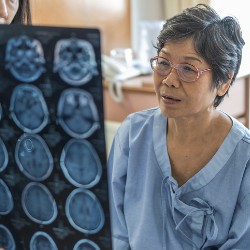UR CTSI Incubator: The Bugs in Your Gut Could Make You Weak in the Knees
Scientists have long thought that osteoarthritis in people who are obese was a consequence of excess wear and tear on joints, but a study funded in part by the CTSI’s Incubator Program suggests the microbiome is a key unappreciated culprit.
The study, published in JCI Insight today, shows that a high fat diet (like the Western diet) can alter the microbiome, increase inflammation throughout the body, and speed deterioration of joints. An interesting twist: a prebiotic supplement, called oligofructose, completely overturned these effects in mice. Read more about the study in the URMC Newsroom.
The study was born out of a 2015 UR CTSI Incubator project led by Michael Zuscik, Ph.D., associate professor of Orthopaedics in the Center for Musculoskeletal Research at URMC.
“Support from the UR CTSI, which has been transformative for our research, really sets the stage for us to open up a whole new avenue of research focusing on gut microbiome-skeletal connections,” said Zuscik.
The Incubator project brought together three research teams to examine the effects of obesity and type 2 diabetes on the musculoskeletal system more broadly. While their interest started with osteoarthritis, the Incubator team also investigated the effect of obesity and diabetes on bone infections, like surgery-associated MRSA infections, as well as bone fracture healing.
People who are obese are five times more likely to get a bone infection – and have more severe infections – after a joint replacement surgery. The Incubator team led by Robert Mooney, Ph.D., professor of Pathology and Laboratory Medicine at URMC, showed that obese mice with bone infections had more inflammation and bone destruction than their lean counterparts, in a recent Journal of Orthopaedic Research paper.
Fractures also tend to heal more slowly in people who are obese. The Incubator team found the same to be true in obese mice, possibly because progenitor cells that should have turned into bone-forming cells, became fat cells instead. Cheryl Ackert-Bicknell, Ph.D., associate professor of Orthopaedics in the CMSR, led this portion of the Incubator project focusing on which genes push progenitor cells to become a fat cell versus a bone-forming cell.
The UR CTSI Incubator Program provides two years of funding for “super-pilot projects.” The program aims to accelerate innovative scientific discovery in the life sciences and public health, leading to new independently funded research programs. The program is supported by the University of Rochester CTSA award (UL1 TR000042, UL1 TR002001) from the National Center for Advancing Translational Sciences of the National Institutes of Health.
Michael Hazard | 4/19/2018



